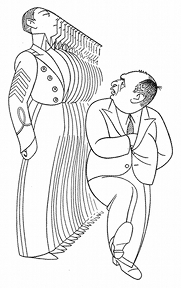In this chapter from his 1932 book, Times Square Tintypes, Broadway columnist Sidney Skolsky profiles Samuel L. “Roxy” Rothafel, the impresario who was responsible for the legendary New York movie palace that bore his nickname.
Roxy also was one of the men behind Radio City Music Hall, a theatre he intended to be a live performance space but which quickly came to be used, for the next 47 years, as a grand and glorious movie palace. The Music Hall opened late in 1932, the year Skolsky’s book was published, which explains the fact that it isn’t mentioned in this profile.
“HELLO, EVERYBODY”
He wanted a monument, so he built the Roxy Theatre and called it, with his usual simplicity, “The Cathedral of the Motion Picture.”
It is a living tribute to a great man. It oozes his personality. It is so great that it has even absorbed the man. He lives in his monument. Has an apartment adjacent to his business office on the sixth floor. The man—oh, yes, Samuel Lionel Rothafel. Everybody calls him what he calls his theater, Roxy.
He averages eighteen hours a day in the theater. When asked to make a speech on, “What I Do With My Leisure Time,” he was obliged to change the subject.
His favorite food is hamburger steak chopped very fine with onions. His favorite delicacy is hot dogs.
He has clothes in four places. At the theater, at home and at two golf clubs. Recently it took two men four weeks to make a complete inventory of his clothing.
In the motion picture industry his position is unique. He is the leader of presentations, the originator of the atmospheric prologue. Also, institutional movie houses, introducing staff uniforms and military ushers.
Has a habit of putting a final touch to a discussion by saying, “Applesauce. Bunk. Baloney.”
The first movie house he ever owned seated two hundred fifty people. The chairs were removable. Every time there was a big funeral there wasn’t any show. They needed the chairs.
Calls everybody by their first name or not at all.
His mascot is a black cat called “Lindy.” The cat walked in from the street the day Lindbergh hopped off for Paris. In has been there ever since.
He speaks with a lisp. Always has a sob in his throat. It’s a great radio voice. “Hello, everybody!”
His favorite eating place is a lunch wagon.
Every Thursday he spends the entire night rehearsing next week’s show. During rehearsals he is a fiery dynamo. Exhorting. Scolding. Unreasonable. Demanding the impossible and getting it. He always refers to his actors and stage crew as “My Children.”
In his apartment at the Roxy he has a valet, a chef and a butler.
His ushers are put through drills by a “Devil Dog” every morning.
His favorite exercise is handball. Is very proud of the fact that he plays well enough to beat Benny Leonard.
The orchestra pit is so large that Arthur Hopkins once remarked to him: “Don’t let the Shuberts see it or they’ll want to build a theatre there.
Every Friday at one o’clock he sits in the last row of the balcony and watches the first performance of the show he has rehearsed all night. Under his chair is coiled an elaborate affair which enables him to broadcast directions backstage. He speaks through a mouthpiece. The audience is unable to hear a word. But the players onstage, the electricians, the property room, the music library and the projection booth receive instructions.
After this he retires to his apartment to get some sleep. He is up again at four watching the second performance. To see that all his corrections have been made.
After this he plays two-handed casino. He plays poker with his staff and loses continuously. He complains they “play too close to the vest.”
His father and sister used to operate a movie house in Forrest City, Pennsylvania.
Really believes he bears a striking resemblance to Napoleon both in character and in appearance.
He has four secretaries. Yet does most of the work himself, for he believes he is the only person who can do the things that made Roxy Roxy.
His business correspondence starts “My dear little girl.” It ends with, “Yours truly, S. L. Rothafel.”
Is a great golf fiend. When he has nothing to do in the office he shoots a paper golf ball around.
Was once a marine, a baseball player and a bartender.
Upon learning that Hugo Riesenfeld attended the University of Paris, he said to him: “From now on, Hugo, you’re going to be known as Dr. Riesenfeld.”
Has a great respect for people who speak English correctly.
His idea of a good joke is to sit a visitor under the mantelpiece in his office and wait for that party to bump his head when rising.
He cannot read a note of music nor can he play an instrument. However, he has a wonderful memory. He can whistle the entire score of Pinafore. While he is conducting the orchestra some of the musicians will not look at the baton for hear they will make a mistake.


